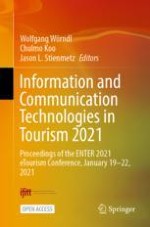
Open Access 2021 | OriginalPaper | Buchkapitel
A Conceptual Framework of Destination Sustainability in Sharing Economy
verfasst von : Huiying Zhang, Xi Yu Leung, Billy Bai
Erschienen in: Information and Communication Technologies in Tourism 2021
Aktivieren Sie unsere intelligente Suche, um passende Fachinhalte oder Patente zu finden.
Wählen Sie Textabschnitte aus um mit Künstlicher Intelligenz passenden Patente zu finden. powered by
Markieren Sie Textabschnitte, um KI-gestützt weitere passende Inhalte zu finden. powered by